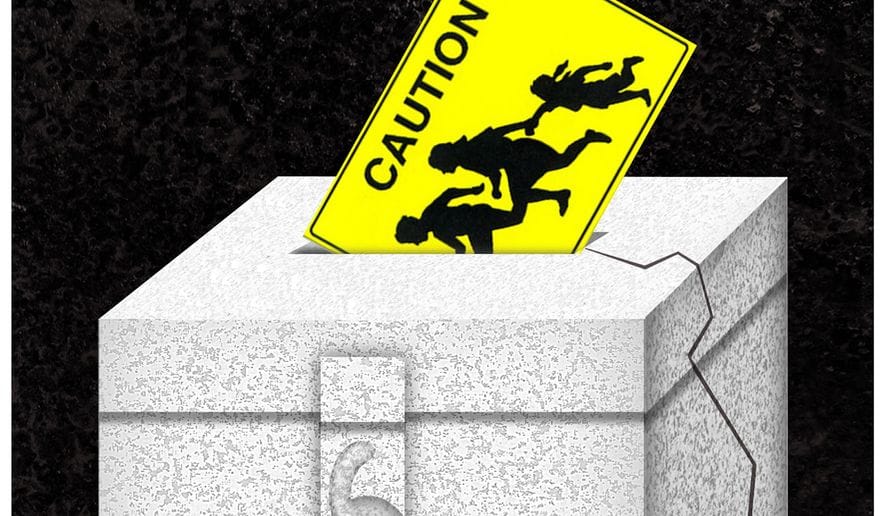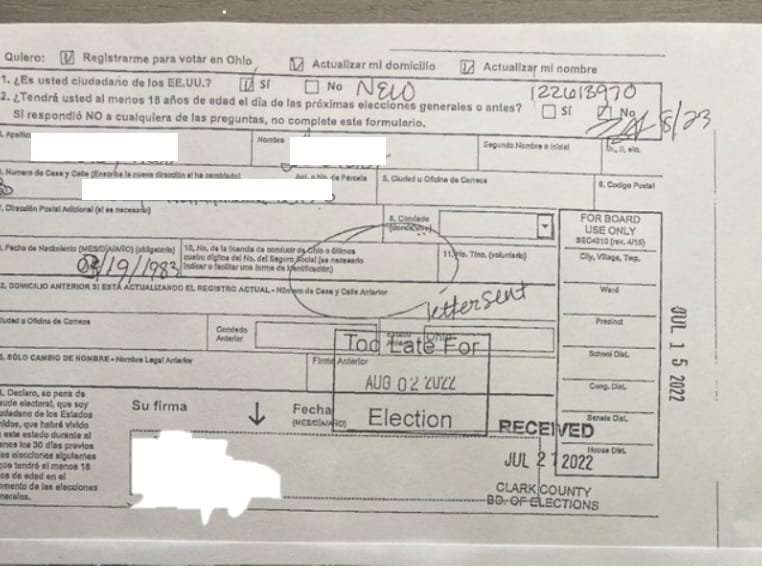As Election Looms, Questions on Integrity Grow

STATEWIDE - With a little over a month away from the general election, one group is sounding the alarm on several security vulnerabilities which may have the potential to tip the scales of power.
Marcell Strbich, a retired Lt Col. in the United States Air Force has been galvanizing a statewide taskforce of citizens and leading grassroots community leaders to take a deep dive into multiple vulnerabilities with Ohio elections specifically. According to Strbich, the current system is rife with potential for fraud and abuse from non-citizen registration and voting to duplicate registrations being left on county and state registers allowing for registrants to either vote multiple times or have their “voter identity” stolen.
Strbich’s experience in the armed services where he helped identify potential security vulnerabilities and brought solutions to address them made him uniquely qualified to take on such a significant task as identifying issues with the state voter registration system. He, along with his coalition of citizen activists have identified nearly 300,000 registrations within the state databases that are in desperate need of follow-up.
“The Secretary of State right now, we did ask him to take upon himself the 250-300,000 registered records that have some form of questionability from mismatched data, duplication,” Strbich said. “[LaRose] has resisted [taking action] by saying that he doesn’t have the authority outside of the legislature to do it and the law doesn’t explicitly tell him to expand the use of that mechanism. There is another statute under his own authority that say that he is supposed to provide a uniform system of marking and removing voters that are ineligible in the statewide voter registration database.”
In an open letter to SoS LaRose signed by state representatives, party committee chair members and activists, Strbich identifies several issues including lack of verification documents being used, noncitizen registration, duplicate registrations and fraudulent registrations. Most recently in Hamilton County, an organization known as Black Fork industries was accused of attempting to commit voter fraud by submitting voter registrations that were identified as fake, including one for a “Henry Kissinger.”
Thanks to the cooperation of some county’s board of elections, Strbich’s coalition was able to conduct an inquiry on a random sampling of ballots from counties like Clark and Montgomery and what was discovered was truly shocking.
“There still isn’t a verification system and that is one of the biggest concerns for citizens; ‘are noncitizens going to dilute the vote,’” Strbich said.
According to Strbich, at this time across the state, hospitals, libraries and social service agencies are all conducting a mass voter registration campaign. When the Board of Elections receives these paper requests, they process them and if any irregularities are found during the process, a letter is issued to the registrant asking if the marking was made in error. If there is no response from the registrant, the registration is put into the system no different than a valid registration. Part of the biggest issue with the current registration campaigns going on is that they are not being done by an agency capable of screening through a statewide or federal database, leading to a greater inability for fraudulent registrations to be flagged.
“The Bureau of Motor Vehicles is the key focal point where when someone comes in and requests a state ID or Driver’s License they can flag it as non-citizen that they can stop it and flag it for the Secretary of State,” Strbich said. “But Ohio has antiquated information systems and the Secretary of State doesn’t receive that directly into his information systems so its this complicated process of where he has to reference this noncitizen ID list, then he has to have a unique identifier number that he is not being given by the Department of Homeland Security. So he is pinning the blame on the DHS and the Biden Administration threatening to sue them so that they are more cooperative in giving him access to databases. Here is the thing, he started this request to get access to the databases five months ago. For three years he didn’t touch this issue and we have had this issue present in our system for quite some time.”
The issue has indeed exploded with the increase in population due to Ohio’s ‘visitors’ from Haiti. In Clark County, there was at one point a Haitian Creole registration form in circulation before the State took action to remove it and investigations into the registration rolls have revealed noncitizens have indeed registered to vote in Springfield.
“The problem with this is in April of 2024 the Department of Public Safety in Ohio pointed out that of 236,000 credentials have been issued to noncitizens in our state, how many of those are registered to vote.” Strbich said. “What can I tell you is there is a lot more than 600 that are going to be on that voter roll. Clark County has a decent board of elections, not every county can claim that. There is a taskforce team that is specifically identifying mismatched data records and is trying to get them flagged or marked, it is called a 257 challenge. Across the state there are taskforce teams and over 2000 challenges have been submitted across the state since May. Now under threat of lawsuit from groups like the ACLU Ohio, now all of the sudden every board of election began dismissing every challenge.”
Strbich is adamant that unlike other county election boards, Clark is one of the few that has been cooperative and interested in discovering some of the underlining issues with the registration system and provided Strbich's taskforce with unparalleled access. During their inquiry into Clark County’s voter rosters, the local task force identified around 20 percent from the sample given with significant issues, including at least one that was even marked as a noncitizen. Because these registrations were not filed through the Board of Elections, in an instance like this, the registration would be processed as a normal registration even though it clearly identified the registrant as a noncitizen.
“There were 181 records that were considered a mismatch, we were given exclusive access because Clark County is trying to cooperate out of those they gave us 141 to look at and out of those we identified 27 that have mismatched data, with very foreign names and out of those, 8 were submitted registration application with no verification information and out of those there were some that had even marking indicating they were not a citizen,” Strbich said.

According to Strbich, Clark County has been incredibly cooperative with the independent taskforces seeking to assist, but are limited in their ability to address this issue. Neighboring Montgomery County had significantly more issues.
“Fifth largest county in the state, they have 1100 duplicate registrations and growing, they are supposed to have 0, Strbich said. “The Secretary of State has a rule that says 14 days prior to the election there are supposed to be 0 duplicates across the state. We currently have across the state around 20,000.”
According to Strbich, the significance of a duplicate registration is that every county has their own database and are unable to know if another county has the same resident counted in other counties. If they do not check for duplicates in a statewise system, then individuals could be voting in multiple counties and be counted as legitimate votes.
A potential solution to these issues would be to flag suspected registrations as provisional at this time, allowing for a process of review to take place before the vote is counted. According to Strbich, one of the main hurdles with prodding the Secretary of State to take action on this issue is a looming fear of lawsuits from activist agencies like the ACLU and others, however the grounds for such a lawsuit would fall under a potential infringement of the right to vote for those affected, which would be alleviated by marking the registrations as provisional, permitting the vote and only counting it once a review and confirmation process had taken place.
At this time, it is expected the letter to SoS LaRose will be presented to him by State Representatives urging his office to act within the established powers of said office and address these issues. While it may be too late to address all of these issues before the election, with overwhelming evidence of incongruities in Ohio's election registration process, it is no longer able to be ignored.




